外研版(2019)选择性必修第二册Unit 6 Survival Developing ideas 课件(15张ppt,内镶嵌视频素材)
文档属性
| 名称 | 外研版(2019)选择性必修第二册Unit 6 Survival Developing ideas 课件(15张ppt,内镶嵌视频素材) | 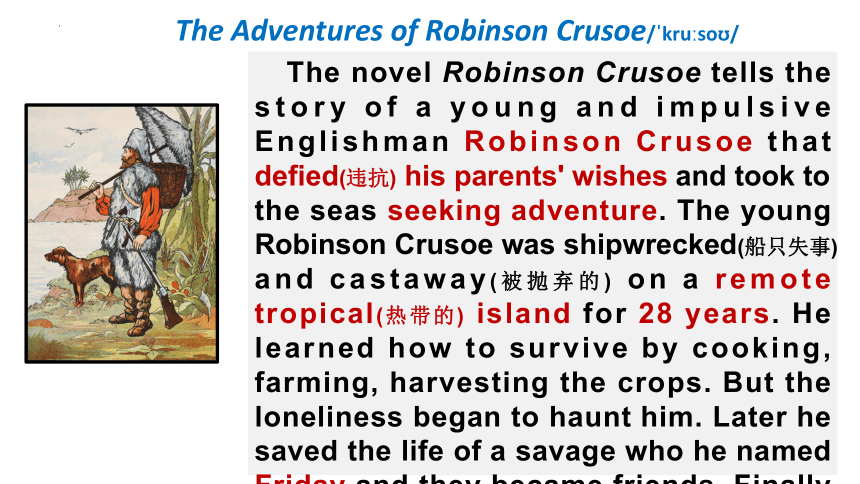 | |
| 格式 | pptx | ||
| 文件大小 | 27.3MB | ||
| 资源类型 | 教案 | ||
| 版本资源 | 外研版(2019) | ||
| 科目 | 英语 | ||
| 更新时间 | 2023-03-13 13:01:07 | ||
图片预览

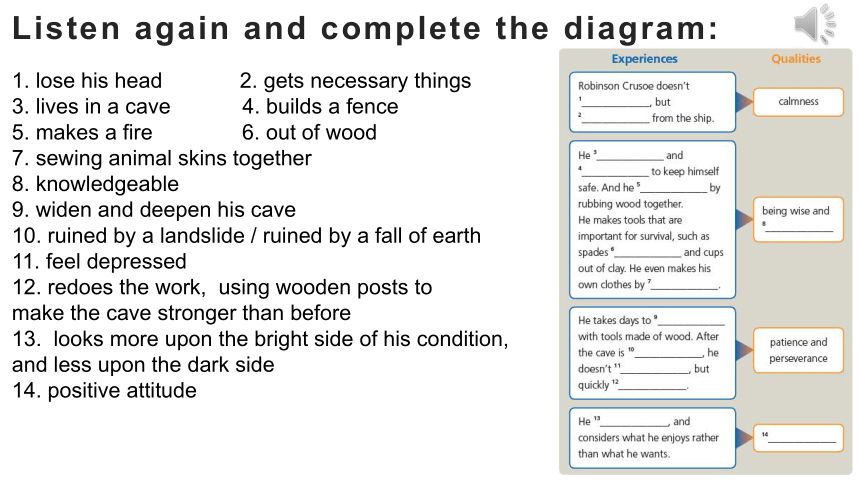
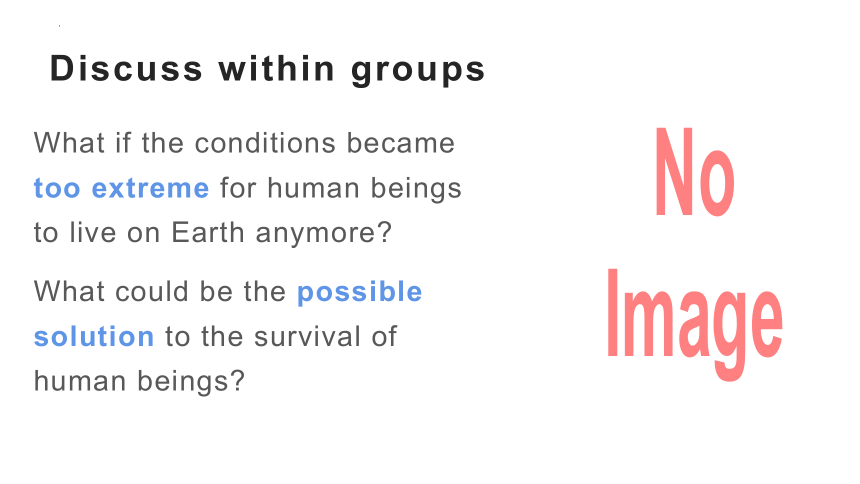
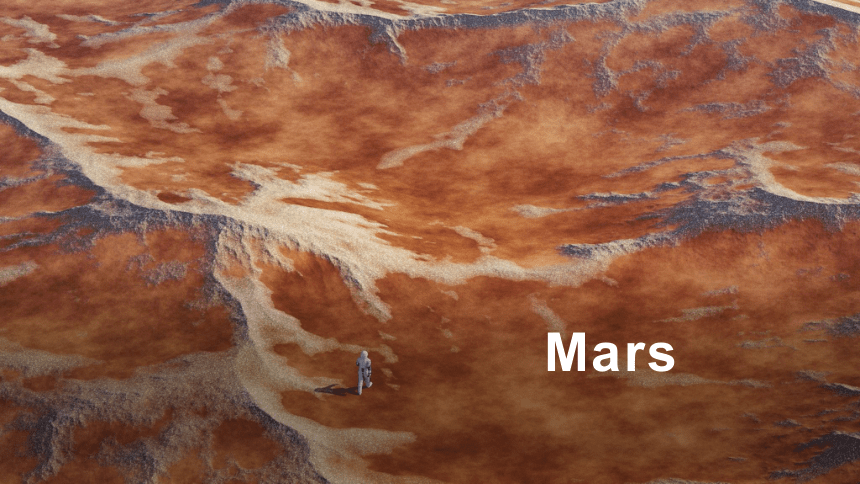
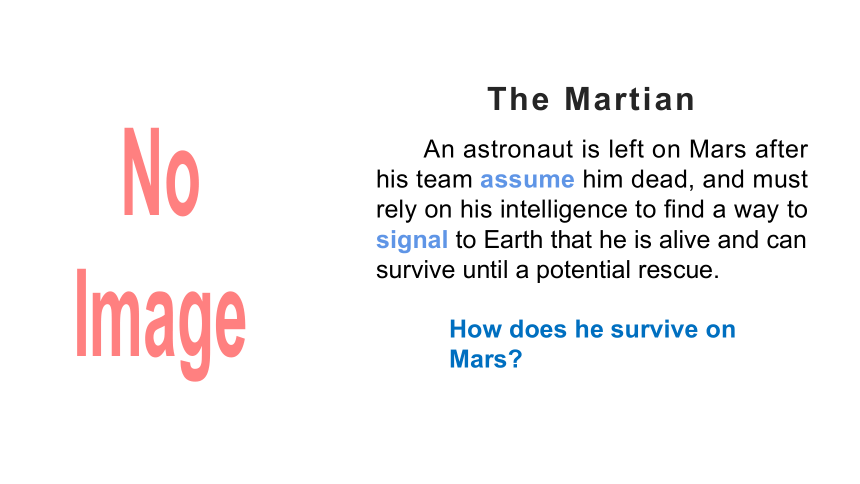

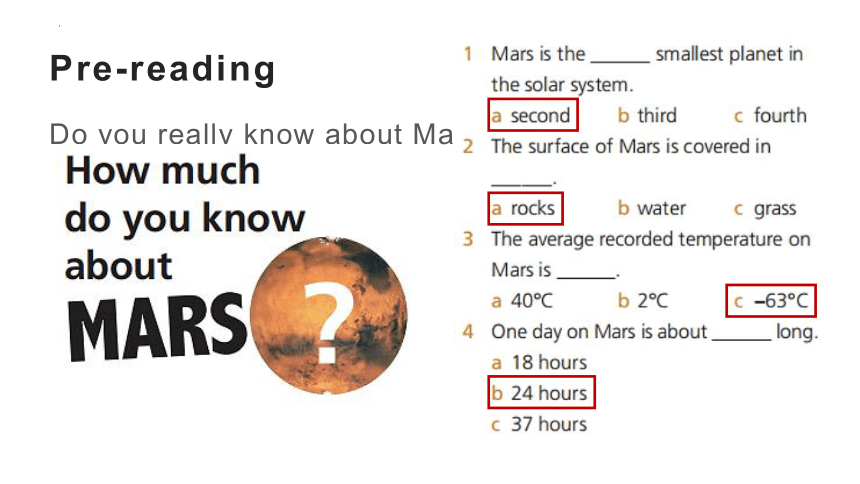
文档简介
The novel Robinson Crusoe tells the story of a young and impulsive Englishman Robinson Crusoe that defied(违抗) his parents' wishes and took to the seas seeking adventure. The young Robinson Crusoe was shipwrecked(船只失事) and castaway(被抛弃的) on a remote tropical(热带的) island for 28 years. He learned how to survive by cooking, farming, harvesting the crops. But the loneliness began to haunt him. Later he saved the life of a savage who he named Friday and they became friends. Finally Crusoe left the island by a British ship and returned to England.
The Adventures of Robinson Crusoe/?kru?so?/
Listen again and complete the diagram:
1. lose his head 2. gets necessary things
3. lives in a cave 4. builds a fence
5. makes a fire 6. out of wood
7. sewing animal skins together
8. knowledgeable
9. widen and deepen his cave
10. ruined by a landslide / ruined by a fall of earth
11. feel depressed
12. redoes the work, using wooden posts to
make the cave stronger than before
13. looks more upon the bright side of his condition, and less upon the dark side
14. positive attitude
Discuss within groups
What if the conditions became too extreme for human beings to live on Earth anymore?
What could be the possible solution to the survival of human beings?
Mars
An astronaut is left on Mars after his team assume him dead, and must rely on his intelligence to find a way to signal to Earth that he is alive and can survive until a potential rescue.
The Martian
How does he survive on Mars?
Pre-reading
Do you really know about Mars?
Pre-reading
1 What is Plan A? Why is Plan B needed?
2 Why Mars?
While-reading
Read and check your prediction.
Para. 1 _______ to life on Earth
Para. 2 _____________?
In the 1960s and 1970s, the greatest fear was that… could be wiped out by nuclear missiles.
Today, however, environmental problems have taken over as the greatest risk to life on Earth.
Plan A
Plan B
Mars is relatively close to Earth and has a ____________ environment than that of other planets.
less hostile
/?h?sta?l/
Risks
Why Mars
Para. 1 Risks to life on Earth
Para. 2 Why Mars?
nuclear missiles → environmental problems
How far have we gone in exploring Mars?
They are mentioned to ___________________________________
_________________________________.
less hostile
Mars Village in North-west China’s Qinghai Province
Mars Desert Research Station
show that our interest in Martian exploration is greater than ever before
Para. 3-4 _______ in exploring Mars
Efforts
Para. 3:
Since the 1960s, we have been sending unmanned spacecraft to Mars.
… space agencies of various countries are planning manned missions to Mars…
Para. 4:
Staying alive… will not be impossible. Biosphere 2 experiment ...
Scientists have succeeded in growing plants in an environment similar to that on Mars.
Para. 1 Risks to life on Earth
Para. 2 Why Mars?
Para. 3-4 Efforts in exploring Mars
Does it mean we give up Plan A?
Para. 5 “We need to take much better care of our own planet.”
Post-reading
In which magazine would you most likely find the passage?
1 The Traveller
2 All About Astronauts
3 Environmental Concerns
4 Biology for Fun
Think & Share
Which is better, to live on Mars or to solve Earth’s problems? Why?
What theme do the two reading passages (The Wild Within &Life on Mars) in this unit have in common? On what aspects does each passage focus?
The two passages share the theme of protecting our living environments. The first passage focuses on balancing nature and urban development, and the need for harmony between humans and animals. The second passage focuese on our need to protect Earth even if we intend to settle on other places such as Mars.
The Adventures of Robinson Crusoe/?kru?so?/
Listen again and complete the diagram:
1. lose his head 2. gets necessary things
3. lives in a cave 4. builds a fence
5. makes a fire 6. out of wood
7. sewing animal skins together
8. knowledgeable
9. widen and deepen his cave
10. ruined by a landslide / ruined by a fall of earth
11. feel depressed
12. redoes the work, using wooden posts to
make the cave stronger than before
13. looks more upon the bright side of his condition, and less upon the dark side
14. positive attitude
Discuss within groups
What if the conditions became too extreme for human beings to live on Earth anymore?
What could be the possible solution to the survival of human beings?
Mars
An astronaut is left on Mars after his team assume him dead, and must rely on his intelligence to find a way to signal to Earth that he is alive and can survive until a potential rescue.
The Martian
How does he survive on Mars?
Pre-reading
Do you really know about Mars?
Pre-reading
1 What is Plan A? Why is Plan B needed?
2 Why Mars?
While-reading
Read and check your prediction.
Para. 1 _______ to life on Earth
Para. 2 _____________?
In the 1960s and 1970s, the greatest fear was that… could be wiped out by nuclear missiles.
Today, however, environmental problems have taken over as the greatest risk to life on Earth.
Plan A
Plan B
Mars is relatively close to Earth and has a ____________ environment than that of other planets.
less hostile
/?h?sta?l/
Risks
Why Mars
Para. 1 Risks to life on Earth
Para. 2 Why Mars?
nuclear missiles → environmental problems
How far have we gone in exploring Mars?
They are mentioned to ___________________________________
_________________________________.
less hostile
Mars Village in North-west China’s Qinghai Province
Mars Desert Research Station
show that our interest in Martian exploration is greater than ever before
Para. 3-4 _______ in exploring Mars
Efforts
Para. 3:
Since the 1960s, we have been sending unmanned spacecraft to Mars.
… space agencies of various countries are planning manned missions to Mars…
Para. 4:
Staying alive… will not be impossible. Biosphere 2 experiment ...
Scientists have succeeded in growing plants in an environment similar to that on Mars.
Para. 1 Risks to life on Earth
Para. 2 Why Mars?
Para. 3-4 Efforts in exploring Mars
Does it mean we give up Plan A?
Para. 5 “We need to take much better care of our own planet.”
Post-reading
In which magazine would you most likely find the passage?
1 The Traveller
2 All About Astronauts
3 Environmental Concerns
4 Biology for Fun
Think & Share
Which is better, to live on Mars or to solve Earth’s problems? Why?
What theme do the two reading passages (The Wild Within &Life on Mars) in this unit have in common? On what aspects does each passage focus?
The two passages share the theme of protecting our living environments. The first passage focuses on balancing nature and urban development, and the need for harmony between humans and animals. The second passage focuese on our need to protect Earth even if we intend to settle on other places such as Mars.
